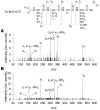A naturally occurring mutation of the opsin gene (T4R) in dogs affects glycosylation and stability of the G protein-coupled receptor
- PMID: 15459196
- PMCID: PMC1351288
- DOI: 10.1074/jbc.M408472200
A naturally occurring mutation of the opsin gene (T4R) in dogs affects glycosylation and stability of the G protein-coupled receptor
Abstract
Rho (rhodopsin; opsin plus 11-cis-retinal) is a prototypical G protein-coupled receptor responsible for the capture of a photon in retinal photoreceptor cells. A large number of mutations in the opsin gene associated with autosomal dominant retinitis pigmentosa have been identified. The naturally occurring T4R opsin mutation in the English mastiff dog leads to a progressive retinal degeneration that closely resembles human retinitis pigmentosa caused by the T4K mutation in the opsin gene. Using genetic approaches and biochemical assays, we explored the properties of the T4R mutant protein. Employing immunoaffinity-purified Rho from affected RHO(T4R/T4R) dog retina, we found that the mutation abolished glycosylation at Asn(2), whereas glycosylation at Asn(15) was unaffected, and the mutant opsin localized normally to the rod outer segments. Moreover, we found that T4R Rho(*) lost its chromophore faster as measured by the decay of meta-rhodopsin II and that it was less resistant to heat denaturation. Detergent-solubilized T4R opsin regenerated poorly and interacted abnormally with the G protein transducin (G(t)). Structurally, the mutation affected mainly the "plug" at the intradiscal (extracellular) side of Rho, which is possibly responsible for protecting the chromophore from the access of bulk water. The T4R mutation may represent a novel molecular mechanism of degeneration where the unliganded form of the mutant opsin exerts a detrimental effect by losing its structural integrity.
Figures











References
Publication types
MeSH terms
Substances
Grants and funding
- EY13729/EY/NEI NIH HHS/United States
- EY08061/EY/NEI NIH HHS/United States
- R01 EY006855/EY/NEI NIH HHS/United States
- R01 EY008061/EY/NEI NIH HHS/United States
- EY06855/EY/NEI NIH HHS/United States
- R01 EY013132/EY/NEI NIH HHS/United States
- P30 EY001730/EY/NEI NIH HHS/United States
- EY01730/EY/NEI NIH HHS/United States
- U10 EY013729/EY/NEI NIH HHS/United States
- GM63020/GM/NIGMS NIH HHS/United States
- R01 GM063020/GM/NIGMS NIH HHS/United States
- EY13385/EY/NEI NIH HHS/United States
- EY13132/EY/NEI NIH HHS/United States
- R01 EY013385/EY/NEI NIH HHS/United States
LinkOut - more resources
Full Text Sources
Other Literature Sources
Miscellaneous

